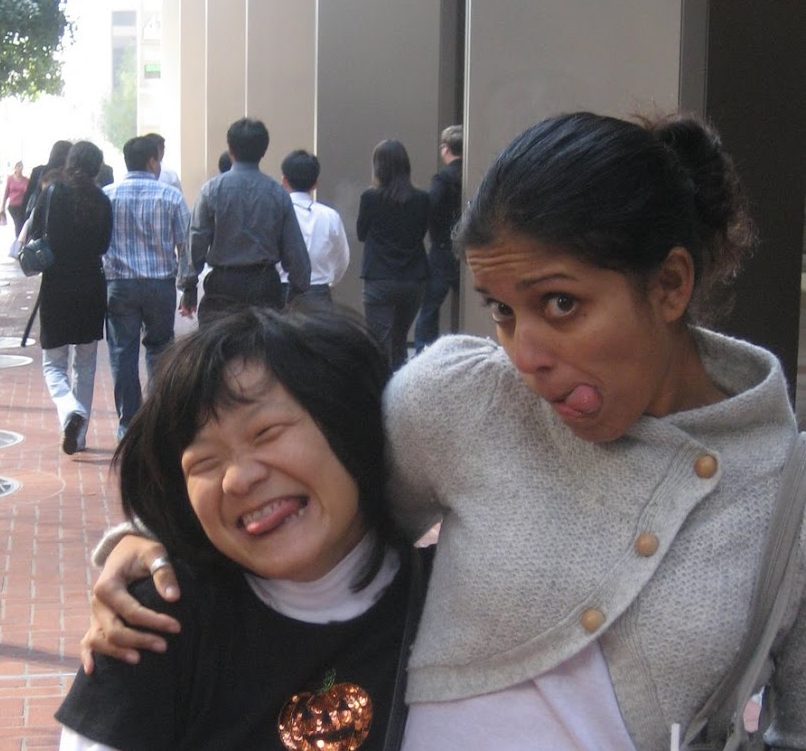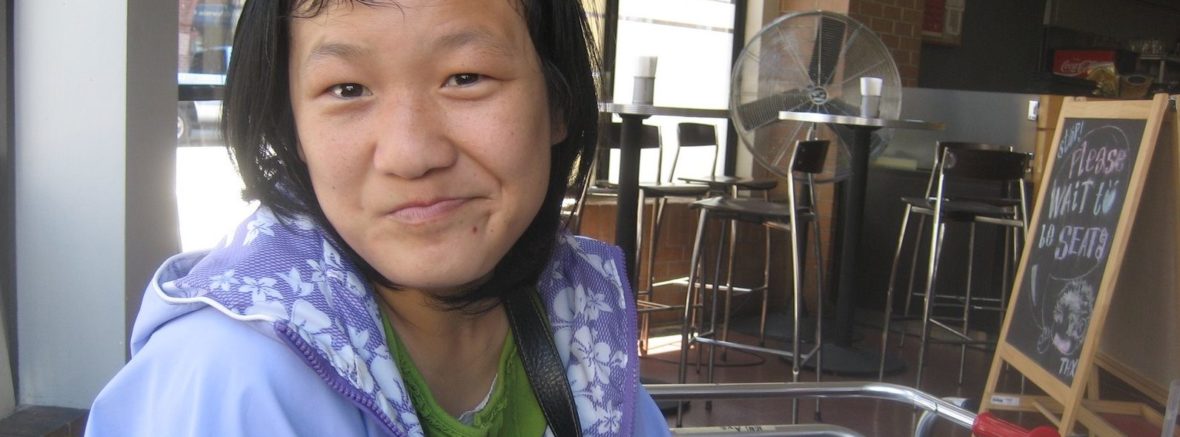Almost 10 years ago I met an incredible woman named Nini, who has cerebral palsy.  I had signed up to volunteer with a program called Best Buddies, where you get paired up to be a buddy to an individual  with intellectual and developmental disabilities (IDDs).  While I had joined Best Buddies as a way to give back, I learned so much more from Nini during the course of our friendship than I had ever anticipated. I learned that Nini was incredibly talented and skilled at activities like cross-stitching, swimming and even acting.  I learned that while she was often reliant on a wheelchair or a walker, that she was extremely independent and knew how to cruise around San Francisco completely on her own. I learned that sometimes everyday tasks could be exhausting for Nini because of her physical and emotional limitations. I learned that Nini had a love for roller-coasters, for traveling and for adventures like skydiving. I learned that she could be as goofy as the best of them, and while she had difficult days that she had a smile that could light up a room. Admittedly, when Nini and I first became buddies, I was not used to the dynamics of our relationship. I didn’t always know how best to handle certain physical challenges or communication barriers or even the uncomfortable stares from strangers. Over time the more we hung out, the more these dynamics became less foreign. Through our friendship I got a tiny glimpse into some of the daily considerations that Nini and her parents have to make- things that I don’t ever have to think about- like whether she can access a certain restaurant or venue or which taxi will be easier for her to get into. Our friendship helped me gain awareness of some of these challenges and gain perspective on appreciating the simplest things in our life.
with intellectual and developmental disabilities (IDDs).  While I had joined Best Buddies as a way to give back, I learned so much more from Nini during the course of our friendship than I had ever anticipated. I learned that Nini was incredibly talented and skilled at activities like cross-stitching, swimming and even acting.  I learned that while she was often reliant on a wheelchair or a walker, that she was extremely independent and knew how to cruise around San Francisco completely on her own. I learned that sometimes everyday tasks could be exhausting for Nini because of her physical and emotional limitations. I learned that Nini had a love for roller-coasters, for traveling and for adventures like skydiving. I learned that she could be as goofy as the best of them, and while she had difficult days that she had a smile that could light up a room. Admittedly, when Nini and I first became buddies, I was not used to the dynamics of our relationship. I didn’t always know how best to handle certain physical challenges or communication barriers or even the uncomfortable stares from strangers. Over time the more we hung out, the more these dynamics became less foreign. Through our friendship I got a tiny glimpse into some of the daily considerations that Nini and her parents have to make- things that I don’t ever have to think about- like whether she can access a certain restaurant or venue or which taxi will be easier for her to get into. Our friendship helped me gain awareness of some of these challenges and gain perspective on appreciating the simplest things in our life.
Now as I have children of my own, I’ve thought about how I can expose them to children with disabilities, so that they can hopefully find their own Ninis.  While I’ve spoken to my girls about Nini and they have hung out with her and played with other children with intellectually and developmentally disabilities, overall their exposure has been pretty limited to date. I have noticed that my older daughter is starting to become more inquisitive about people with disabilities. Last week while at the airport during our spring break vacation, my 5-year old noticed a fellow passenger in a wheelchair, who had Down Syndrome. My daughter had a ton of questions about the woman, which I did my best to answer. We then decided to go up to the woman and say hello. My 5-year old was unsure of this whole idea at first. But after we spoke to the woman and her family for a few minutes, my daughter gave her a drawing she had made on the plane. The drawing was received with great appreciation and we learned that my daughter and this woman both shared a love of art. Upon learning about this shared interest, my 5-year old smiled really big and even commented on this commonality as we walked away.
After our brief encounter I decided that over the next few days, I wanted to continue speaking to my girls about kids with disabilities. After doing some research online, I learned about a book called “My Friend Isabelle” and of a Daniel Tiger show called “Daniel’s New Friend/ Same and Different.” My girls and I read the book and watched the show together. Both the book and the show talk about a friendship between a child with a disability and one without. The key message both resources provide is that while children with disabilities are different than children without disabilities, they also share many similarities. As the Daniel Tiger episode emphasized through a song, “In some ways we are different, but in so many ways we are the same.”
This was one of the biggest learnings I had from my friendship with Nini — that despite our differences, she and I shared a lot of common interests. And while she has certain limitations, she has the same human needs and desires that we all have. I strongly believe that this is something worth teaching our children to help them build compassion, to respect one another.
First, we can use books and resources like the ones above to educate our children so we start building awareness and making it part of our conversations with our children. But we can also find opportunities to interact with children with disabilities — create organic play opportunities or brief encounters to work past the natural initial discomfort we all experience. For this reason, Mindful Littles is in the process of creating a partnership program with a school for children with disabilities. My hope is that my littles can be lucky enough to one day find a friend like Nini, an angel, someone who will touch their lives in ways they can’t yet imagine.




Share this: